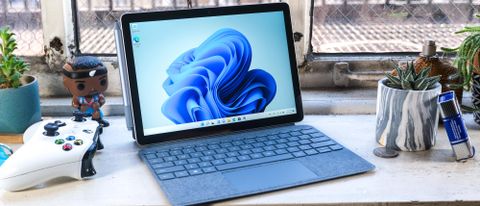Microsoft just gave you another reason to update your PC — November's Patch Tuesday fixes 63 flaws
Including a patch for a zero-day flaw and a patch for a critical vulnerability too

Here at Tom’s Guide our expert editors are committed to bringing you the best news, reviews and guides to help you stay informed and ahead of the curve!
You are now subscribed
Your newsletter sign-up was successful
Want to add more newsletters?

Daily (Mon-Sun)
Tom's Guide Daily
Sign up to get the latest updates on all of your favorite content! From cutting-edge tech news and the hottest streaming buzz to unbeatable deals on the best products and in-depth reviews, we’ve got you covered.

Weekly on Thursday
Tom's AI Guide
Be AI savvy with your weekly newsletter summing up all the biggest AI news you need to know. Plus, analysis from our AI editor and tips on how to use the latest AI tools!

Weekly on Friday
Tom's iGuide
Unlock the vast world of Apple news straight to your inbox. With coverage on everything from exciting product launches to essential software updates, this is your go-to source for the latest updates on all the best Apple content.

Weekly on Monday
Tom's Streaming Guide
Our weekly newsletter is expertly crafted to immerse you in the world of streaming. Stay updated on the latest releases and our top recommendations across your favorite streaming platforms.
Join the club
Get full access to premium articles, exclusive features and a growing list of member rewards.
Though not as big of an event as last month, Microsoft’s November Patch Tuesday does contain fixes for 63 unique flaws including critical fixes for one actively exploited zero-day vulnerability and a critical severity bug.
Of the 63 total flaws, 4 are rated critical and 59 are important in severity. As far as the type of vulnerability associated with the bug: 29 of them are related to privilege escalation, 16 are remote code execution, 11 are information disclosure, 3 are denial of service (DoS) two security feature bypass and two are spoofing bugs.
According to reporting from Dark Reading, the zero-day vulnerability (tracked as CVE-2025-62215 ) is a privilege escalation flaw that was discovered and reported on by the Microsoft Threat Intelligence Center (MSTIC) and Microsoft Security Response Center (MSRC). It affects the Windows Kernel, is tied to a race condition and allows attackers to manipulate the timing of specific conditions. Basically, this means that attackers who have already gained access to a system can escalate to admin level rights to do even more damage.
The critical severity bug( tracked as CVE-2025-60724) is a RCE flaw in the GDI+ graphics component for Windows. According to Microsoft, attackers can trigger this vulnerability on web services by uploading malicious documents which contain a bad metafile. Exploits that are successful allow attackers to execute arbitrary code or to steal data from infected systems without requiring any user interaction.
How to keep your Windows PC safe

It's important to install any new system updates or patches on your Windows laptop or desktop computer as soon as they become available. From there, you want to make sure that Microsoft’s built-in Windows Defender antivirus is set to periodically scan your system for dangerous malware and other viruses. For extra protection though, you may also want to consider running one of the best antivirus software suites alongside it.
Besides securing your Windows devices with antivirus software, you also want to be extra careful online. Don’t click on any links or download any attachments from unknown senders as they could contain malware or send you to a phishing site designed to steal your sensitive personal and financial data. Though it should go without saying, you also want to avoid pirating software as well as TV shows and movies since a hacker could easily add malware to these illegal downloads.
By practicing good cyber hygiene and regularly updating your computer, you should be safe from the majority of attacks that use known Windows security flaws to their advantage.
Get instant access to breaking news, the hottest reviews, great deals and helpful tips.

Follow Tom's Guide on Google News and add us as a preferred source to get our up-to-date news, analysis, and reviews in your feeds.
More from Tom's Guide
- Samsung phones infected with 'Landfall' spyware through WhatsApp images — what you need to know
- This Android malware has your debit card and PIN — and it’s making withdrawals
- Phishing scam alert: This "We found your lost iPhone" text is fake and wants to steal your Apple ID

Amber Bouman is the senior security editor at Tom's Guide where she writes about antivirus software, home security, identity theft and more. She has long had an interest in personal security, both online and off, and also has an appreciation for martial arts and edged weapons. With over two decades of experience working in tech journalism, Amber has written for a number of publications including PC World, Maximum PC, Tech Hive, and Engadget covering everything from smartphones to smart breast pumps.
You must confirm your public display name before commenting
Please logout and then login again, you will then be prompted to enter your display name.
 Club Benefits
Club Benefits










